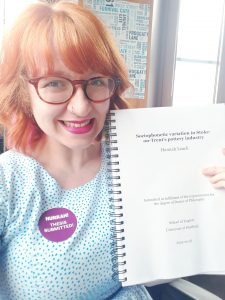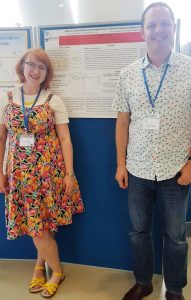Research history and overview
With much debt owed to a string of excellent English teachers through school and college, I completed a BA in English Language and Linguistics at the Lancaster University between 2007 and 2010, and an MA in Linguistics at the University of York in 2012. I completed my PhD at the University of Sheffield in summer 2018, with the generous support of the Wolfson Foundation and the fantastic guidance of Dr Emma Moore and Dr Chris Montgomery. I have also worked as an RA on several linguistics projects covering sociophonetics, gesture and morphology.
My general linguistic pursuits were in the realm of phonetics and phonology, dialectology, identity and sociolinguistics, but I’m also really interested in language and prejudice, language and social class, rhythm and gesture, internet linguistics and swearing. My area of interest and expertise was Stoke-on-Trent, which is my hometown and my favourite subject ever. I also wrote alongside my friend Kate on a variety of language topics at So Long As It’s Words, a site which (we hope) balances the academic and the ridiculous.
Doctoral thesis
My thesis explored variation and social meaning in two main variables in the Stoke-on-Trent – /h/-dropping (the presence or absence of word-initial [h]) and the (i) vowel (broadly, the unstressed [ɪ] vowel found in suffixes such as –es, –ed, –age, -est and –ing; words such as it, him and his; and opaque words like tennis and biscuit). I investigated these variables according to broad social categories such as gender and class, locally-meaningful social categories linked to the internal structure of the local pottery industry, and interactional moments and topics. I conducted this analysis using an oral history archive in which local speakers who worked in the Pottery industry detail their memories of the city and its industry, with the generous help and knowledge of Stoke-on-Trent Museums.
My work was based in acoustic phonetics, and combined broad statistical and correlational analysis with qualitative investigation of meaning in interaction. My analysis brought in various theories of language variation, style and topic, including Labov’s (1972) attention to speech and Bell’s (1984) audience design, but drew most of all from speaker design research, pioneered and codified by Mendoza-Denton (1997), Eckert (2000), Bucholtz & Hall (2005) and Coupland (2007), based upon Silverstein’s (1976) theory of indexicality, and in continuing use in the work of Shilling-Estes (1999), Moore (2010), Podesva (2007) and Kirkham (2013) to name just a few.
Related research interests
My research career almost exclusively centred around Stoke-on-Trent, and I only scratched the surface. The local accent and dialect is very under-researched, yet has many salient local variables and is the source of a great deal of local pride and divided opinion. My fundamental research aim was to uncover the linguistic features of Stoke-on-Trent English, examine how they vary, and document them for further research. To put the dialect on the map, so to speak.
My BA dissertation investigated whether and why people from the north-west Midlands were better able to identify the Stoke accent (among others) better than people from the rest of the country, and has subsequently been developed and published as Leach, Watson and Gnevsheva (2016). My MA dissertation launched a preliminary investigation into the acoustic properties of unstressed vowels in Stoke-on-Trent English and in particular their linguistic constraints, which I developed in my doctoral thesis.
In the year between my MA and PhD, Chris Montgomery and I collaborated on a paper which investigated perception of and attitudes towards the local accent, demonstrating a polarised combination of extreme local pride in the dialect and embarrassment at its wider perception as parochial and ‘common’. In 2019, we revisited this data, and compared it to a real-time perceptual study of Stoke-on-Trent English, examining which features were most readily recognised in each survey.
My research goal was to explore the issue of identity in the city through my thesis and beyond. Once the ceramics capital of the world, Stoke-on-Trent was a city full of highly-skilled manual workers with a strong working class mentality. However, the deindustrialisation of the UK’s manual industries throughout the last 50 years has seen this industrial core fall out of the city, with little to fill its place. The locals, now, are at once fiercely proud of the city’s heritage and history, and often embarrassed and disappointed at its fall from grace and current economic struggles. The local accent is very closely tied to identity in Stoke-on-Trent, and many respondents to our survey cited a perceptual distinction between a traditional (warm and friendly) Potteries accent and a contemporary (ugly and chavvy) Stokie accent. I would be intrigued to know whether this distinction is based in linguistic reality.
Other research interests
Northern and non-standard accents; acoustic phonetics and motivation for sound change; prejudice towards accents and real-life impacts of accentism; perceptual dialectology; exemplar theory.

